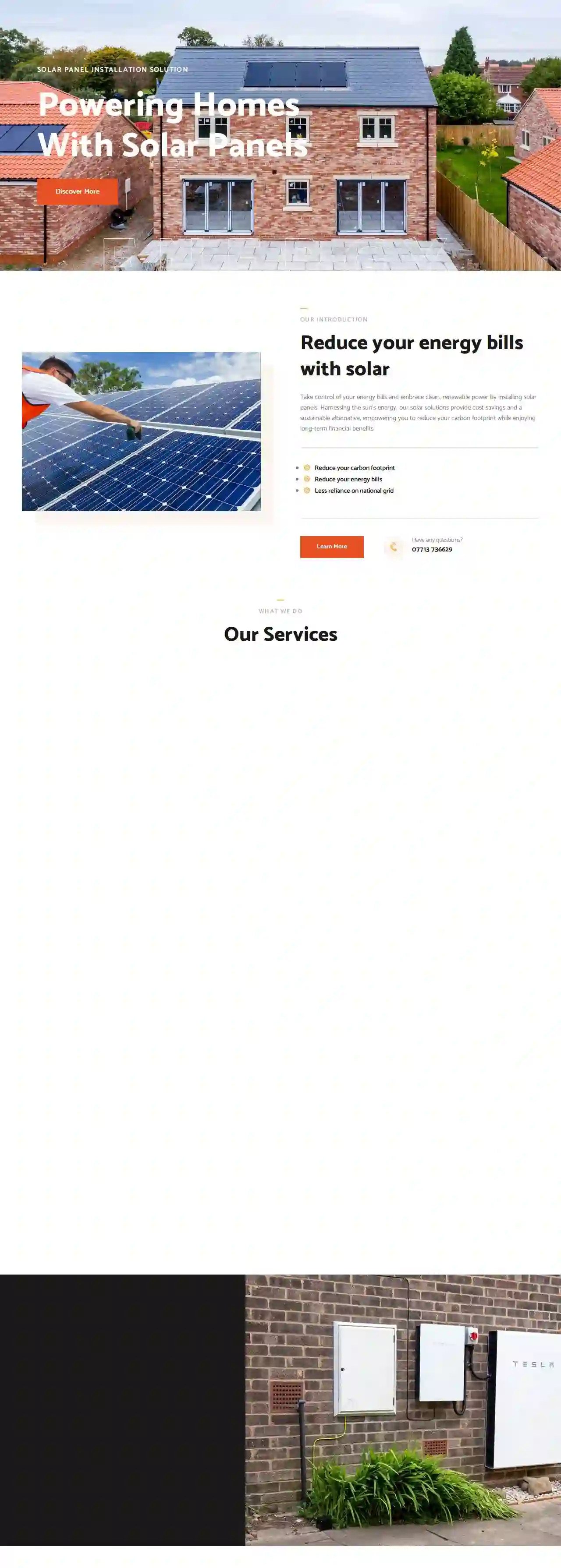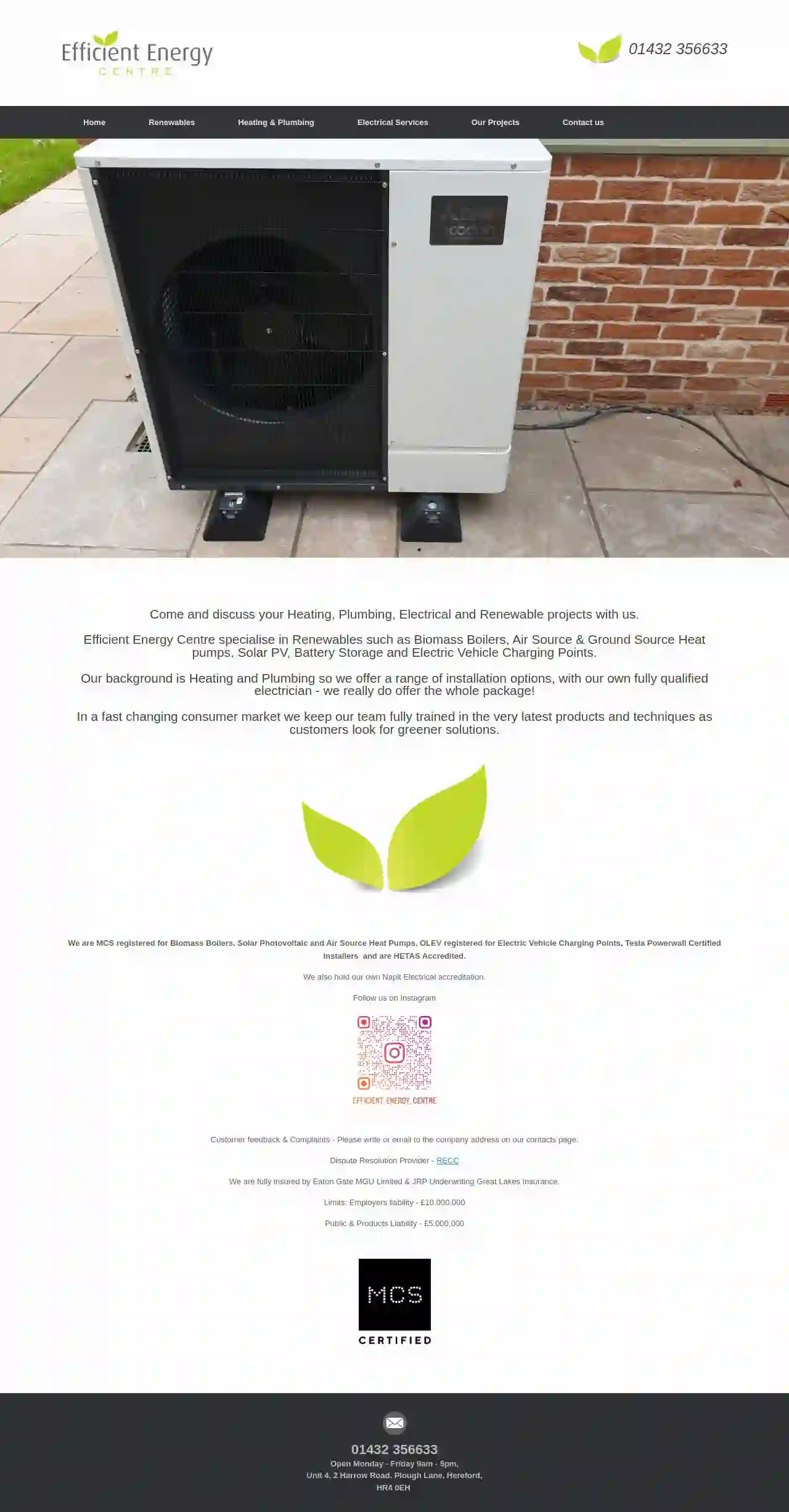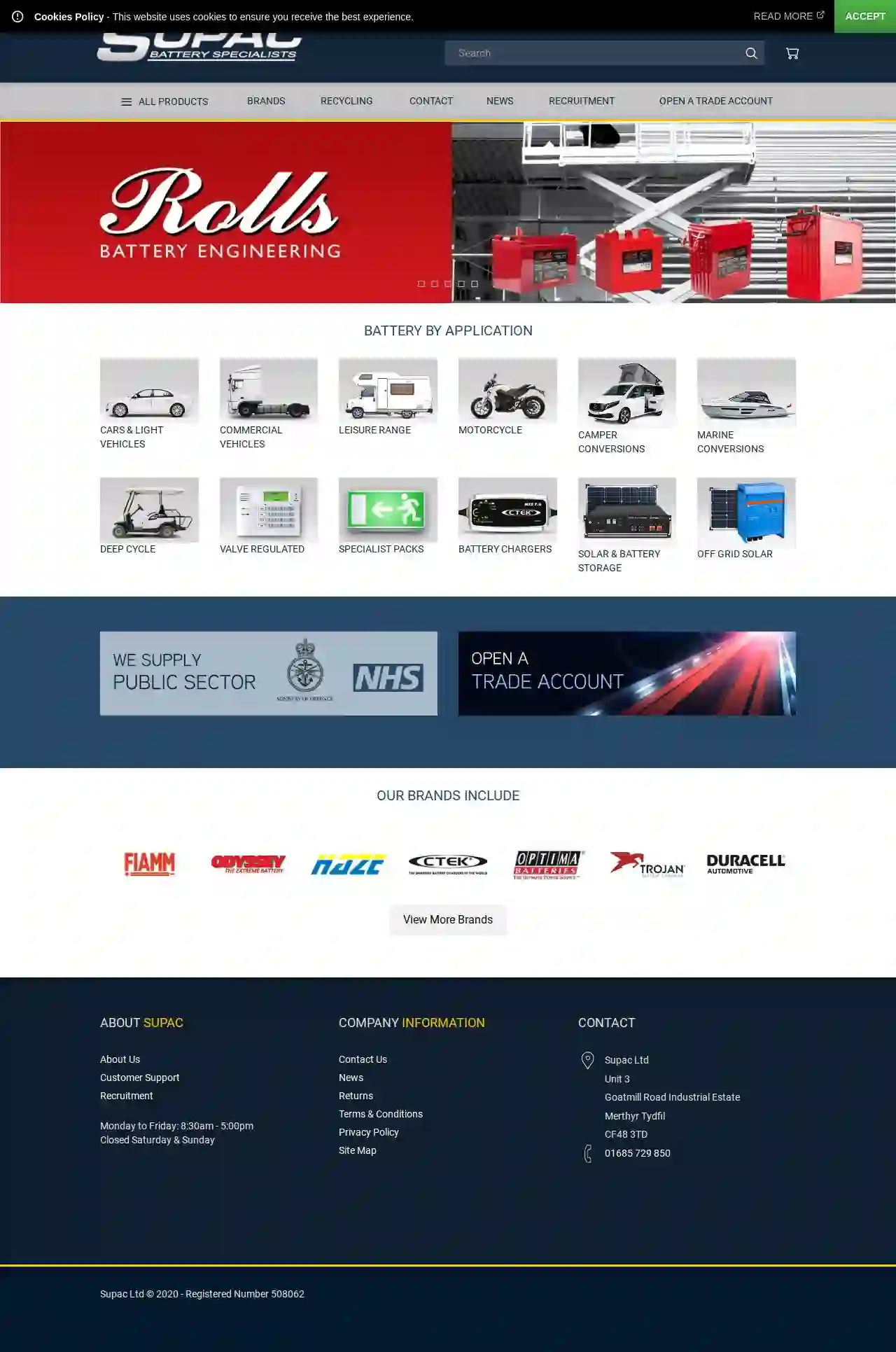Solar Installers Bridport
Find top Solar Installation Company in Bridport
Receive 3 FREE Solar Panel Installer quotes for your project today! Compare profiles, reviews, accreditations, portfolio, etc... and choose the best offer.

BB Solar Ltd
51 reviewsExeter, GBBB Solar is a dedicated solar p.v and battery storage company committed to helping you save money on your electricity bills while promoting renewable energy sources. Our team of experts boasts years of experience installing and commissioning systems for both homes and businesses. At BB Solar, we prioritize providing our clients with the highest level of service, from the initial consultation to aftercare support. Our goal is to help you make the best decision for your energy needs, whether it's installing a solar p.v system, battery storage, or a combination of both. We understand that every home and business is unique, so we take the time to assess your specific energy requirements before recommending the right system. Our team will guide you through the entire process, from start to finish, ensuring your complete satisfaction. One of the key benefits of choosing BB Solar is our commitment to aftercare services. We're always available to assist you with any issues or questions you may have regarding your solar p.v or battery storage system. Our team is dedicated to making your experience with us not only positive but enjoyable as well. Whether you're looking to save money on your electricity bills or simply want to reduce your carbon footprint, BB Solar is here to help. Contact us today to schedule a consultation and discover how we can help you achieve your energy goals.
- Services
- Why Us?
- Gallery
Get Quote
Pigeon solar panels
532 reviewsBristol, GBPigeon Solar Panels is a UK-based company specializing in solar panel services, including pest-proofing, cleaning, and removal. With over a decade of experience, their team of highly qualified experts provides comprehensive solutions for all your solar panel needs. They offer a range of services, from basic pest protection to full panel cleaning and maintenance packages. Pigeon Solar Panels prides itself on its commitment to customer satisfaction, offering flexible scheduling, free consultations, and a satisfaction guarantee. They are dedicated to ensuring your solar panels operate efficiently and safely, protecting your investment and the environment.
- Services
- Why Us?
- Our Team
- Testimonials
- Gallery
Get Quote
Efficient Energy Centre
4.613 reviewsUnit 4, 2 Harrow Road, Plough Lane, Hereford, HR4 0EH, GBCome and discuss your Heating, Plumbing, Electrical and Renewable projects with us.Efficient Energy Centre specialise in Renewables such as Biomass Boilers, Air Source & Ground Source Heat pumps, Solar PV, Battery Storage and Electric Vehicle Charging Points.Our background is Heating and Plumbing so we offer a range of installation options, with our own fully qualified electrician - we really do offer the whole package!In a fast changing consumer market we keep our team fully trained in the very latest products and techniques as customers look for greener solutions.We are MCS registered for Biomass Boilers, Solar Photovoltaic and Air Source Heat Pumps, OLEV registered for Electric Vehicle Charging Points, Tesla Powerwall Certified installers and are HETAS Accredited.We also hold our own Napit Electrical accreditation.Follow us on Instagram Customer feedback & Complaints - Please write or email to the company address on our contacts page. Dispute Resolution Provider - RECC We are fully insured by Eaton Gate MGU Limited & JRP Underwriting Great Lakes Insurance. Limits: Employers liability - £10,000,000 Public & Products Liability - £5,000,000
- Services
- Why Us?
- Accreditations
- Gallery
Get Quote
South West Solar Solutions
53 reviewsBristol, GBShaping a sustainable energy future for all. HomeAqueous2024-01-11T09:44:20+00:00 Making renewable energy a realitySolar PanelsSolar panels – official name photovoltaics (PV) – trap the sun’s energy and transform it into electricity that you then can use to power your home. EV ChargersAn electric vehicle charging station links an electric vehicle (EV) to an electricity supply to recharge electric cars and plug-in hybrids. Heat PumpsA heat pump draws and amplifies heat from a source, such as the air around it, ground-stored geothermal energy, or nearby sources of water or waste heat from industry. The Value of SolarClean, free energyAs the UK works towards achieving its goal of net-zero carbon emissions by 2050, the role of solar energy is more vital than ever. The sun provides an inexhaustible and clean source of power that can significantly reduce the nation’s reliance on fossil fuels. Solar installations are becoming more efficient and affordable, and South West Solar Solutions can help you on your journey to cleaner energy and money saving.
- Services
- Why Us?
- Gallery
Get Quote
Green Flare Ltd
4.762 reviews200 South Liberty Lane, Bristol, BS3 2TY, GBWelcome to Green Flare, where innovative ideas meet elegant engineering. With more than three decades of combined experience, we pride ourselves on the design and installation of bespoke renewable energy solutions for homes and commercial properties in Bristol and beyond. From solar panels and heat pumps to underfloor heating and battery storage, our team of designers and engineers marry high-end renewable technologies with unparalleled expertise to deliver elegant energy solutions. At Green Flare, we believe in a world in which innovation and sustainability converge, marrying elegant engineering with premium components to produce exceptional results. With the escalating costs of traditional energy, our solutions exist as intelligent alternatives to outdated technologies. By reducing reliance on conventional fuel sources, Green Flare bespoke systems decrease utility bills and increase immunity to future price fluctuations. As well as helping you to cut your carbon emissions and reduce your energy costs, we’ll use our MCS accreditation to grant access to government funding when appropriate. Decades of experience designing and installing elite renewable energy systems for commercial and residential properties have enabled us to foster long-standing relationships with world-leading manufacturers. This allows us to approach every project with an unfaltering attention to detail, developing solutions that are expertly tailored to your home or business. Our work is a testament to the belief that luxury should not come at the earth's expense. By investing in renewable energy systems for your home or commercial property, you are not just making a choice for today but investing in a cleaner future. Choose Green Flare for elite systems, seamless integration and unbeatable aftercare.
- Services
- Why Us?
- Accreditations
- Testimonials
- Gallery
Get Quote
GB-Sol Ltd
4.324 reviewsTreforest Industrial Estate, Renewable Energy Works, Cardiff, CF37 5YB, GBEstablished in 1994, GB-Sol is an independent UK company, manufacturing solar PV panels and mounting systems at our spacious factory on the Treforest Industrial Estate, just north of Cardiff. A spin-out from the Cardiff University solar test centre, GB-Sol has been at the forefront of solar power generation for several decades. Today, we continue to lead in the application of solar through our stunning roof-integrated solar power systems, solar slates, ruggedised panels and marine applications. Our installations can be provided with all of the additional components you require, including optimisers, batteries, remote monitoring, arc fault protection, bird proofing and firefighter isolators.
- Services
- Why Us?
- Accreditations
- Gallery
Get Quote
4 Seasons Solutions
4.817 reviewsExeter, Unit 3 Skyways Fair Oak Close Exeter Airport Business Park, GBWelcome to 4 Seasons Solutions, a family run company that specialises in all types of renewable energy. We have a great team of renewable energy engineers that specialise in the installation of all types of energy systems including solar panels and heat pumps. From our Exeter base, we serve customers across Devon, Dorset and the South West. Our common goal is to offer a high quality installation service of the most efficient and suitable renewable energy and energy efficient solutions available to our clients. With over 20 years experience in the Air Conditioning, Solar Panels and the Renewable Energy market, you can be assured of our consistently high standards and reliable advice at all times. 4 Seasons Solutions is a family run company with both partners still actively working out in the field, ensuring that from design to installation, our clients are delivered the best possible sustainable and renewable energy solutions.
- Services
- Why Us?
- Testimonials
- Gallery
Get Quote
HIS RENEWABLES
Oberzent-Beerfelden, Siemensstraße 4, 64760, GBHIS - we connect solar energy HIS CONNECT solar wiring system Komponenten für PV-Professionals Die One-Stop-Shop-Lösung zum Verkabeln und Verschalten von PV-Anlagen HIS CONNECT Übersicht PV Verkabelungs-Lösung HISkon Übersicht HIKRA SOLAR KABEL Steckverbinder Verteiler Inlinesicherung / -diode Adapter / Verlängerungen First Solar Series 6 Kabelkonfektionierung DC/AC Stringboxen HISbox Übersicht Residential Rooftop Commercial & Industrial Rooftop Utility Scale BESS-Combiner für RE:Integration Direkt Kontakt aufnehmen +49 6068 9314400 E-Mail schreiben HIS CONNECT PLUS solar wiring solution All-in-One für EPC & PV-Business HIS Industrial Services und E-Mobility Lösungen Industrial Services Maßgeschneiderte Beratungs-, Fertigungs- und Serviceleistungen für OEM-Kunden HIS Energy Intelligente Energieversorgung mit schlüsselfertigen Energiespeicher-und EV-Ladelösungen Direkt Kontakt aufnehmen +49 6068 9314430 E-Mail schreiben HIS Renewables Systeme. Komponenten. Services. Zur Integration von erneuerbaren Energien Bei Aufgaben im Umfeld der Integration von Erneuerbaren Energien schwören führende Planungs- und Installationsunternehmen aus der PV- und EV-Branche auf die umfassenden Systemlösungen von HIS. Produkte für Residential, Commercial & Industrial System-Komponenten für Installations-Profis Ob hochwertige Einzelkomponenten, vorkonfektionierte Solarkabel oder individuell entwickelte Stringboxen: Das Verkabelungs- und Verschaltungssystem HIS CONNECT enthält alles, was Installateure zum Verkabeln von Lösungen im Umfeld der Erneuerbaren Energien brauchen. weiter zu HIS CONNECT Energiespeicher- und EV-Ladelösungen Plug-and-Play Lösungen für RE:Projekte Mit der sichersten und zuverlässigsten LFP-Batterietechnologie, einem hochmodernen intelligenten Energiemanagementsystem und einer modularen Batterielösung können Sie Ihre Gewinne maximieren, die Abhängigkeit vom Stromnetz verringern und neue Einnahmemöglichkeiten schaffen. weiter zu HIS ENERGY Maßgeschneiderte Fertigungs- & Serviceleistungen Industrial Services für OEM-Kunden Ob Control-Boxen für die Trackeransteuerung, BOS-Komplettlösungen, Leitersätze für Speichersysteme oder Backup-Systeme für Hybrid-Lösungen: Unsere OEM-ermöglichen es Ihnen und Ihren Kunden, erfolgreich am Markt aufzutreten und Ihre Wettbewerbsposition zu festigen. weiter zu HIS Industrial Services 1 Marke. 1000 Möglichkeiten. Ausgestattet mit hochwertigen Komponenten Ausgelegt auf individuelle Anforderungen Geprüft für eine hohe Anlagenrentabilität mehr über HISbox DC/AC Stringboxen erfahren Branchenlösungen Perfekt abgestimmt auf Ihren Bedarf Seit knapp 20 Jahren arbeiten wir daran, die Verkabelung und Verschaltung von Solaranlagen jeden Tag besser zu machen. Besser für den Installateur, besser für den Betreiber und besser für die Umwelt. Das Ergebnis unserer Arbeit sind montagefreundliche und nachhaltige Lösungen, die auch in puncto Wirtschaftlichkeit Maßstäbe setzen. RESIDENTIAL Produkte für die Verkabelung von privaten PV-Aufdachanlagen COMMERCIAL & INDUSTRY Produkte für die Verkabelung von gewerblichen PV-Anlagen POWER PLANT Produkte für die Verkabelung von gewerblichen PV-Kraftwerken STORAGE Produkte und Zubehör für die Verkabelung von Speicherkraftwerken FLOATING PV Produkte und Zubehör für die Verkabelung von schwimmenden PV-Anlagen RETROFIT & REPOWERING Produkte und Dienstleistungen für das Repowering von PV-Anlagen Haben Sie Fragen? E-Mail schreiben Telefon +49 6068 9314400 HIS CONNECT Systemkomponenten Hikra Solarkabel Die Rundum-Kabellösung für international erfolgreiche EPC & Montage-Unternehmen, die mehr von Ihren Lieferanten erwarten. Mehr Erfahren PV Steckverbinder& Crimpwerkzeuge Sichern Sie die Langlebigkeit Ihrer Anlage mit individuell auf Ihren Bedarf abgestimmten Steckverbindern sowie den passenden Crimpwerkzeugen. HISkon Verteiler Vermeiden Sie Fehler in der Montage und reduzieren Sie den Kabelaufwand und -verschnitt mit Verteilern aus unserem Programm. HISkon Sicherungen Sichern Sie einzelne oder auch mehrere parallel geschaltete Strings mit Hilfe unserer Inlinesicherungen ab. HISkon Dioden Steigern Sie die Wirtschaftlichkeit und Betriebssicherheit Ihrer Solaranlage mit einer perfekt auf Ihren Bedarf ausgesuchten Strangdiode. HISkon Kabelbäume& Verlängerungen Reduzieren Sie Ihren Montageaufwand durch den Einsatz industriell konfektionierter Kabelbäume und individuell markierter Verlängerungen. HISbox DC/AC Stringboxen Setzen Sie bei der Verschaltung Ihrer Solaranlage auf individuell geplante und anschlussfertig gelieferte Stringboxen von HIS. Kosten reduzieren. Ertrag steigern. Die beste Wahl für First Solar HIS CONNECT PLUS Kabellösungen für First Solar Series 6 Dank (teil-)automatisch vorkonfektionierter und montagefertig gelieferter Verteiler verkürzen Sie die Montagezeit auf der Baustelle auf ein Minimum. Manuelles Konfektionieren, kostspielige Kabelverschnitt und zeitinstensives Troubleshooting gehören so ein für alle Mal der Vergangenheit an. Mehr erfahren HIS BlogINFORMATIV. INTERESSANT. NÜTZLICH. HIS präsentiert neues Markendesign. Als führender europäischer Anbieter in der Solarbranche ist es nun Zeit für… weiterlesen Wirtschaftsminister Al-Wazir macht sich ein Bild der HIS GmbH Wirtschaftsminister Tarek Al-Wazir besucht bei seiner Sommertour durchs… weiterlesen Warum für ein Elektroauto entscheiden? Verschaffen Sie sich einen ersten Überblick über die Vorteile von… weiterlesen Impressum Datenschutzerklärung AGB HIS Renewables GmbH Siemensstraße 4 64760 Oberzent-Beerfelden T +49 6068 9314430 E [email protected] Sitemap HIS CONNECT HIS CONNECT PLUS HIKRA SOLAR KABEL First Solar Series 6 HIS CONNECT Floating HISkon Übersicht PV Steckverbinder HISkon Inlinesicherung HISkon Verteiler HISbox Übersicht HISbox DC Combiner Aufdachanlage HISbox DC Combiner Utility Scale HISbox AC Combiner HISbox Monitoring HISbox BESS-Combiner HISbox NA-Schutz Social Media LinkedIn HIS Blog his we connect solar energy
- Services
- Why Us?
- Accreditations
- Gallery
Get Quote
Mypower - Commercial Solar Professionals Cheltenham
51 reviewsToddington, Cheltenham, Quercus House, Orchard Industrial Estate, GL54 5EB, GBWelcome to Mypower, the UK's leading commercial solar panel installation company. We design and install solar PV systems for businesses since 2010. Our company is a solar panel company that designs, supplies, and installs award-winning photovoltaic (PV) systems, enabling companies to generate their own electricity, lower their long-term energy costs, and reduce their impact on climate change. We have been in business for over 10 years and have installed over 100,000 solar panels. Our team is highly experienced in commercial solar panels, agricultural, industrial, and community solar installations, including roof, ground mount, and bespoke solutions. We provide a reliable flow of low-priced electricity to use on site, and our solar panels for companies provide a significant reduction in electricity overheads, energy security, and substantial carbon footprint reductions.
- Services
- Why Us?
- Gallery
Get Quote
Supac Ltd
4.818 reviewsUnit 3, Goatmill Road Industrial Estate, Merthyr Tydfil, CF48 3TD, GBSupac Ltd has been actively involved in the manufacture and distribution of batteries for over 72 years. Founded in 1948 by Electrical Engineer Hadyn Morgan, Supac & the Celtic Batteries brand proved to be a recognisable name in the battery manufacturing and distribution industry. From humble beginnings, Supac gradually expanded its operation to full scale manufacturing. The manufacturing facility produced Car, Commercial and Leisure batteries for Wales & the South West of England. Due to global changes in the late 1990s and advances in the battery market, Supac, in keeping with other UK battery manufacturers, ceased manufacturing in order to concentrate on the supply and distribution of new battery technologies. In 2009, Merthyr Tydfil became the base for a brand new 12,000 sq ft distribution facility with capacity for over 800 pallets. Strategically placed for better transport links and customer support, the new facility will enable all customers to be welcomed into an environment which will lead the way for other distributors to follow. Our extensive range also includes specialist batteries for the leisure, marine, mobility, security and medical sectors. The addition of a unique and patented battery recycling product adds to the diverse product range that Supac now offers. Family-owned and family-run, Supac prides itself on the depth of its knowledge and expertise, and welcomes customers, old and new.
- Services
- Why Us?
- Gallery
Get Quote
Over 3,485+ Solar Installers on our platform
Our solar contractors operate in Bridport & surroundings!
SolarCompaniesHub has curated and vetted Top Solar Installers in and around Bridport. Find a top & trustworthy contractor today.
Frequently Asked Questions About Solar Installers
- Tax Credits: Reduce your income tax liability based on the cost of your solar system.
- Rebates: Direct cash payments or discounts on the purchase of a solar energy system.
- Net Metering: Allows you to sell excess solar electricity back to the grid for credits.
- Renewable Energy Certificates (RECs): Tradeable credits representing the environmental attributes of your solar energy generation.
- System size
- Roof complexity
- Weather conditions
- Permitting and inspections
- Installer's schedule
Are there any financial incentives for going solar?
How do solar panels work?
Do solar panels increase my home value?
How long does it take to install solar panels?
Are there any financial incentives for going solar?
- Tax Credits: Reduce your income tax liability based on the cost of your solar system.
- Rebates: Direct cash payments or discounts on the purchase of a solar energy system.
- Net Metering: Allows you to sell excess solar electricity back to the grid for credits.
- Renewable Energy Certificates (RECs): Tradeable credits representing the environmental attributes of your solar energy generation.
How do solar panels work?
Do solar panels increase my home value?
How long does it take to install solar panels?
- System size
- Roof complexity
- Weather conditions
- Permitting and inspections
- Installer's schedule